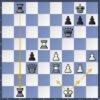The 2025 FIDE Women`s Chess World Cup has reached its dramatic conclusion, not with an international showdown, but with a uniquely national spectacle: an all-Indian final. The stage is set for a captivating duel between the venerable Grandmaster Koneru Humpy and the prodigious International Master Divya Deshmukh. This contest is more than just a fight for a title; it is a compelling narrative of generational transition, a clash of strategic philosophies, and a profound statement on India`s burgeoning influence in the world of women`s chess.
The Architects of a New Era
For years, the highest echelons of women`s chess were often dominated by a select few nations. Yet, the 2025 World Cup final unequivocally declares a shift in global chess dynamics. With Koneru Humpy and Divya Deshmukh securing their places in the final, India has not only guaranteed itself a champion but has also solidified two spots in the prestigious Candidates Tournament. This achievement is a clear testament to the strategic investments and burgeoning talent within the Indian chess ecosystem.
A Legacy Embodied: Koneru Humpy
Koneru Humpy, at 38, represents the established guard, a figure of immense pedigree and quiet determination. As the world No. 4 and a reigning two-time World Rapid Chess Champion, her resume speaks volumes. She was the first Indian woman to attain the Grandmaster title and, notably, the second-youngest woman globally to achieve this feat. Her career, marked by a World Championship challenge in 2011 and a triumphant return after a two-year maternity break, exemplifies resilience and enduring excellence. Humpy`s strategic depth and positional mastery have been her hallmarks, earning her a rightful place as arguably the greatest Indian woman chess player of all time. Her current “late-career renaissance” is less a surprise and more a reaffirmation of her profound understanding of the game.
The Ascendant Star: Divya Deshmukh
In stark contrast stands Divya Deshmukh, a mere 19-year-old, yet to formally achieve her Grandmaster norms – though a World Cup victory would instantly confer the title. Divya is the embodiment of the new wave, a fearless competitor who has carved a path through the tournament with an aggressive, high-risk approach. Her 2025 season has been nothing short of spectacular, highlighted by a victory over former World Champion Hou Yifan and a “giant-killing spree” at the World Cup itself. Top seeds like Lei Tingjie and Zhu Jiner, along with experienced compatriots such as Harika Dronavalli, have all succumbed to Divya`s tactical prowess. Her journey to the final underscores a generation of players who, perhaps, learned their opening theory and positional concepts not solely from dusty tomes, but from the relentless, impartial logic of chess engines.
The Ultimate Contrast: Style and Spirit
The final is not merely a clash of generations but a fascinating exposition of divergent chess philosophies. Humpy`s game is characterized by solidity, meticulous positional play, and a profound understanding of long-term strategic advantages. It`s the chess of classical education, where patience is a virtue and every piece move is a carefully considered step in a grand plan. Divya, on the other hand, embraces a more audacious, tactical style. Her game is often marked by sharp, complex positions, where calculated risks lead to explosive opportunities. One might muse whether this reflects the modern paradigm: the battle between time-honored human intuition and the cold, unyielding precision absorbed from algorithmic calculations. The board, in this context, becomes a canvas for two distinct artistic expressions of intellectual combat.
A Milestone for Indian Chess
Regardless of who lifts the trophy, this all-Indian final is a significant milestone for the nation`s chess landscape. It reinforces India`s position as a burgeoning superpower in the sport, not just in the open category, but increasingly so in women`s chess. Both players have already secured their berths in the Candidates Tournament, ensuring continued Indian representation at the highest levels of the game. This outcome provides a compelling narrative for aspiring chess players across India, demonstrating that the pinnacle of the sport is not an unreachable dream, but a tangible aspiration.
The Countdown to Coronation
The final commences with two classical rounds, scheduled for Saturday, July 26, and Sunday, July 27. Should these two games not yield a decisive victor, the World Cup`s fate will be determined by tie-break rounds on Monday. For Indian chess enthusiasts, the question is not who will win, but which era will claim the immediate triumph: the proven wisdom of experience or the electrifying audacity of youth? Either way, India wins.











